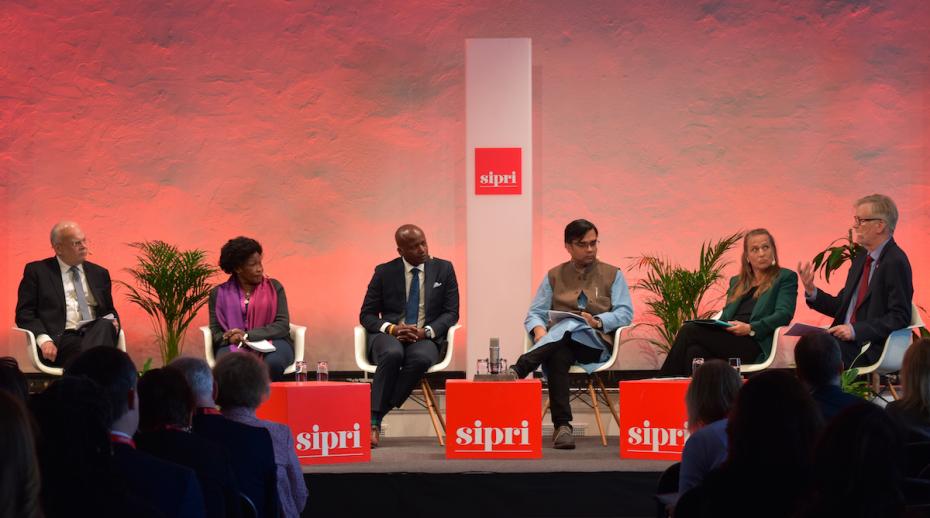
(Stockholm, 6 May 2024) Over the next three days, more than 400 participants from over 40 countries and 70 partner organizations will convene in person for the 11th annual Stockholm Forum on Peace and Development. Watch today’s opening session here.
Stefan Löfven, Chair of the SIPRI Governing Board, opened the 2024 Forum ‘On the Edge: Navigating a Changing World’. His welcoming address declared that we are here not only as witnesses but as active participants in a world on the edge of a global crisis. ‘With these challenges as a backdrop, the idea of a universal right to peace and equality might seem like a distant goal. I do, however, encourage all of us to remain hopeful, because at the end of the day, we have the collective power to address these challenges if we do it right,’ said Löfven. He opened the Forum as a space for finding pathways to a peaceful and more sustainable future.
Under the theme of ‘Building Trust in a Divided World’, the opening panel today agreed that it is crucial to address the structural drivers of conflict if we are to deliver the world we wish to see, in particular by addressing structural injustice. It is also vital to keep talking, and listening, and to look at the world from the perspective of the most marginalized.
Dag Juhlin Dannfelt, Director General and Head of Global Department, Swedish Ministry of Foreign Affairs, emphasized that today’s world is multipolar with competing spheres of interest and waning trust. The fragmented landscape can only be united if everyone is willing to talk and listen. ‘Talking is important. As diplomats, we talk too little . . . As diplomats it is good to understand how your opponent thinks.’
Betty Bigombe, Ambassador of Uganda to Malaysia, underlined this point, saying, ‘It is important that we can talk, but not amongst ourselves. Let’s reach out. It’s normal to disagree.’ She also urged the audience to consider how they can contribute to peace in the world and for peace processes to incorporate innovative methods to ensure that trust and recognizing trauma are central elements.
Highlighting climate action and the move to green technologies as a chance to start the process of rebuilding trust and addressing global inequality, Fonteh Akum, Executive Director of the Institute for Security Studies, said it is ‘an offer that addresses industrialization on the African continent, that drives up the production in value chains and creates a different value proposition. It is one then that also brings Africa out of marginalization in the global space.’
Calling also for the pyramid to be inverted, Amitabh Behar, Executive Director of Oxfam International, spoke about the current global crisis not as a polycrisis but as a crisis of the concentration of power and urged attendees to think about how to reconfigure the redistribution of power and wealth. ‘If we are talking of enduring peace, how do we juxtapose the trillions of investments in military expenditure with actually declining public expenditure in public health and education. So that is really the question we need to look at.’
Katja Keul, Minister of State, Federal Foreign Office of Germany, stressed that the world needs to find its way back to common ground and find a way to talk from different perspectives. ‘We don’t have a choice. We all live in this one single world. We have a responsibility for each other, so let’s go step by step and do the work.’
Highlighting two themes from the discussion on climate diplomacy to rebuild trust and keeping the conversation going, SIPRI Director Dan Smith concluded by underscoring that a balance needs to be found between what we can do now and how the structural imbalances can be addressed later.
Rewatch the live stream of the opening panel here.
Tune in at 10.45 CEST tomorrow to watch the plenary session ‘Rethinking Conflict Prevention’.
Join the closing panel of the 2024 Stockholm Forum ‘Intersecting Crises, Joined-up Solutions’ on Wednesday at 12.30 CEST.
About the Stockholm Forum
The 2024 Stockholm Forum will feature a diverse range of sessions, including high-level policy debates, roundtables, workshops and fireside chats. These will give policymakers, development and humanitarian actors, peace entrepreneurs, researchers, security experts, and civil society organizations space to discuss and work towards integrated solutions to security, peace and development challenges.
The Forum works with partners to foster open exchange between the humanitarian, development and peacebuilding communities. It offers an innovative platform for sharing knowledge, novel practices and ongoing policy developments. This includes knowledge and evidence related to specific countries, regions and regional organizations, including the European Union and its neighbourhood, NATO, the African Union and others. Perspectives from the Global South, including emerging economies, are particularly encouraged.
More information
For information and photo requests contact Mimmi Shen (mimmi.shen@sipri.org, +46 766 286 133) or Stephanie Blenckner (blenckner@sipri.org, +46 8 655 97 47).
Photos and videos from the event are available on SIPRI’s website. Follow @SIPRIorg on Twitter with #SthlmForum. Livestreams of plenary sessions are available on SIPRI’s YouTube channel.